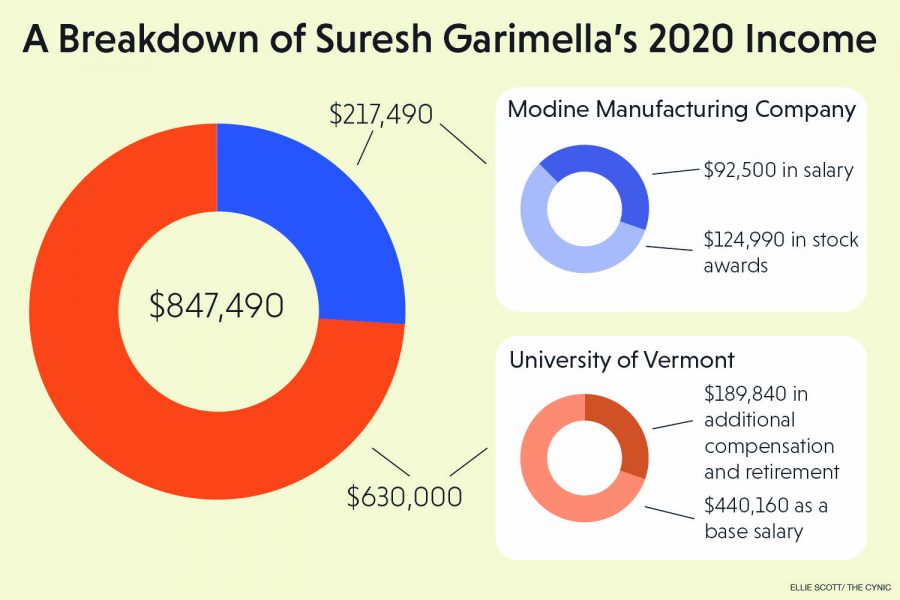In a year marked by financial hardship at UVM, its president made over $800,000
UVM President Suresh Garimella made over $200,000 outside of his UVM compensation last year, amounting to a cumulative income of nearly $1 million.
In the same year that Garimella brought in roughly $847,000, cuts across the College of Arts and Sciences left some professors below the Vermont livable wage, and others without jobs.
Garimella’s additional income came from his position on the board of directors at Modine Manufacturing Company, which specializes in thermal management systems and components.
As Chair of the Technology Committee, Garimella made $217,490 at Modine last year, according to the company’s most recent proxy statement on May 29, 2020. This makes him the third-highest paid board director at the company.
Garimella was elected to the Board of Directors May 18, 2011, and became chair of the committee roughly two months later, stated Sylvia Stein, the General Counsel and Corporate Secretary at Modine.
His position at Modine predates his time at UVM, where he became president July 1, 2019.
Garimella currently owns over 48,755 units of Modine Manufacturing stock, valued at $15.86 per stock as of 1 p.m. March 18. This would equate to $773,254 if he were to sell all stock now.
A report of Garimella’s insider trading actions by the U.S. Securities and Exchange Commission (SEC) shows that he only sold stocks once.
On Aug. 23, 2018, Garimella sold 14,181 units of Modine stock, a trade valued at $250,295 according to SEC documents.
At UVM, President Garimella made $440,160 in base pay during the 2020-2021 school year. Including additional compensation and his retirement plan, his salary is estimated to be $630,000 a year, according to a Feb. 22, 2019, VTDigger article.
In a movement called, “Chop From the Top,” several UVM affiliates have claimed that Garimella’s salary is too high, especially compared to the salaries of non-administrative faculty.
“What we mean when we say chop from the top is let’s have a more equitable distribution of resources. Let’s not have wealth hoarded at the top and cut off the most valuable programs,” English professor Helen Scott said in an interview with the Cynic on Feb. 2, 2021.
Scott said she thought it was unfair that administrators were taking home six-figure salaries while many staff at UVM “do not make a livable wage.”
Frustrations with UVM’s salary disparities arose last May when the administration instituted a 25% reduction in workload and in salary for non-tenure-track faculty in the College of Arts and Sciences to protect the University’s financial security during the onset of the COVID-19 pandemic.
With these cuts at the forefront of their minds, faculty members worried about how they would feed their families.
“After a 25% reduction in my salary, I will still be a full-time lecturer, but my salary will be 41% below the livable wage, yielding hardship, frustration and pain for me as a single parent,” said Rachael Montesano, a non-tenured lecturer in the romance languages department and single mother of two.
The 25% reduction in roughly 70 lecturers’ workloads and pay was eventually reversed in late September, according to a Sept. 30 SevenDays article.
Garimella’s salary at the University has not been affected throughout the pandemic, except for in April, when he voluntarily decided to forgo his salary for one month.
“The state of the University is sound, but we have to implement a number of strategies to ensure that this continues to be the case,” Garimella stated in an April 8, 2020 email to students.
This single month of Garimella’s salary accounted for 8% of his base pay salary and 6.3% of his total pay at the University, around $40,000. This number is just 4.7% of his total compensation between UVM and Modine.
The “Chop from the Top” campaign became popular again this winter when the University eliminated over two dozen programs in the College of Arts and Sciences and fired three professors to compensate for budget shortfalls due to the COVID-19 pandemic.
Of the three professors — Charles Briggs, Jamie Williamson and Stephen Wright — all made less than $75,000 in base salary during the 2019-2020 school year.
Briggs made $46,642, Williamson made $67,743 and Wright made $73,027.
Garimella’s external work and income at Modine does not conflict with any of the University’s policies, UVM spokesperson Enrique Corredera stated in a Mar. 8, 2021 email.
“UVM’s Board of Trustees was fully informed about [Garimella’s position at Modine] and, following due diligence, determined that it does not pose a conflict of interest or commitment as per UVM policy,” Corredera stated.
Corredera added that Garimella’s scholarly expertise in the technology field appropriately aligns with Modine’s business vision.
“President Garimella is a highly cited scholar in the field of electronics thermal management and energy efficiency at micro and nano-scales, and in sustainable energy systems technology and policy,” Corredera stated.
All activities by UVM administrators and staff must meet the University’s code of ethics, conflict of interest and conflict of commitment policies.
“Institutions of higher education operate for the common good to ensure the preservation and advancement of knowledge through its creation and dissemination and not simply to further the interest of either individual employees or the institution as a whole,” the conflict of interest and commitment policy states.










